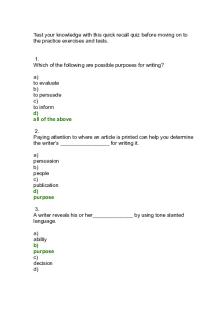Lecture notes- Audience, Tone, Purpose Notes PDF

| Title | Lecture notes- Audience, Tone, Purpose Notes |
|---|---|
| Course | Effective Business English |
| Institution | University of Ottawa |
| Pages | 6 |
| File Size | 79.7 KB |
| File Type | |
| Total Downloads | 58 |
| Total Views | 134 |
Summary
Download Lecture notes- Audience, Tone, Purpose Notes PDF
Description
Audience, Tone, Purpose Notes Purposes of writing? -inform -persuade -analyze -express -entertain What are the characteristics of good informative writing? -clear and easy to follow -concise -well-organized -purpose-driven What are the characteristics of persuasive writing? -seeks to hook reader -tries to convince audience to accept writer’s point of view -concludes with call to action, recommendations, etc. What are the characteristics of analytical writing? -breaks a topic down into its component parts -looks for the patterns between parts and between the parts and the whole -draws conclusions/findings from these relationships What is the difference between a reader-centred text and a writer-centred text? Reader-centred writing focuses on reader and reader’s needs, rather than the writer’s. o Attempts to understand perspective of reader o Establishes a common ground with reader o Identifies benefits for reader o May appeal to values, beliefs, or emotions of reader o Understands the reader’s comfort zone—vocabulary; degree of formality, complexity of o Information and of sentence structure Receiver (audience) Analyzing your receiver before writing your message is key to delivering reader-focused texts What are the different factors that define a particular audience? The Different Factors: -age
-socio-economic level -education -rank/position -level of knowledge
Position/Rank: -colleague -subordinate -superior
Level of knowledge: -layperson -expert -executive -user -mixed Level of knowledge: -layperson
-expert -executive -user -mixed Level of knowledge: -layperson -expert -executive -user -mixed Level of knowledge: -layperson -expert -executive
-user -mixed Level of knowledge: -layperson -expert -executive -user -mixed Level of knowledge: -layperson -expert -executive -user -mixed
Level of knowledge: -layperson -expert -executive -user -mixed Tone Denotes the writer’s unspoken or implicit attitude towards her material and reader.
Why is tone so important? -creates different levels of formality and informality -sets different moods, eg. positive, negative, hopeful, demoralized -allows writer to manage reader’s expectations and response
Why is tone so important? -creates different levels of formality and informality -sets different moods, eg. positive, negative, hopeful, demoralized -allows writer to manage reader’s expectations and response What are some of the factors that convey tone? -word choice and diction -choice of medium -choice of salutation and close -imagery and descriptive language...
Similar Free PDFs

Purpose and Tone
- 18 Pages

2. Cross-purpose mistake notes
- 2 Pages

20736404 - Lecture notes notes
- 1 Pages

Lecture notes
- 4 Pages

Lecture Notes
- 44 Pages
Popular Institutions
- Tinajero National High School - Annex
- Politeknik Caltex Riau
- Yokohama City University
- SGT University
- University of Al-Qadisiyah
- Divine Word College of Vigan
- Techniek College Rotterdam
- Universidade de Santiago
- Universiti Teknologi MARA Cawangan Johor Kampus Pasir Gudang
- Poltekkes Kemenkes Yogyakarta
- Baguio City National High School
- Colegio san marcos
- preparatoria uno
- Centro de Bachillerato Tecnológico Industrial y de Servicios No. 107
- Dalian Maritime University
- Quang Trung Secondary School
- Colegio Tecnológico en Informática
- Corporación Regional de Educación Superior
- Grupo CEDVA
- Dar Al Uloom University
- Centro de Estudios Preuniversitarios de la Universidad Nacional de Ingeniería
- 上智大学
- Aakash International School, Nuna Majara
- San Felipe Neri Catholic School
- Kang Chiao International School - New Taipei City
- Misamis Occidental National High School
- Institución Educativa Escuela Normal Juan Ladrilleros
- Kolehiyo ng Pantukan
- Batanes State College
- Instituto Continental
- Sekolah Menengah Kejuruan Kesehatan Kaltara (Tarakan)
- Colegio de La Inmaculada Concepcion - Cebu










